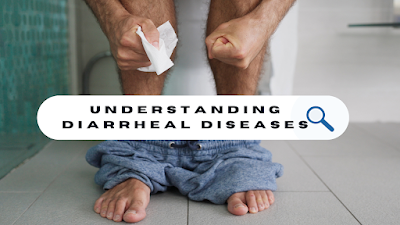Understanding Diarrheal Diseases: Symptoms, Causes, and Prevention
Diarrheal diseases pose a significant global health challenge, affecting millions of people every year. In this article, we will delve into the symptoms, causes, and prevention strategies associated with these prevalent illnesses.
 |
| Understanding Diarrheal Diseases: Symptoms, Causes, and Prevention |
Introduction to Diarrheal Diseases
Diarrheal diseases encompass a range of conditions characterized by loose, watery stools occurring more frequently than usual. While often considered a minor inconvenience, persistent diarrhea can lead to dehydration, electrolyte imbalances, and even death, particularly in vulnerable populations such as young children and the elderly. Understanding the nuances of diarrheal diseases is crucial for effective management and prevention.
Common Symptoms of Diarrheal Diseases
The hallmark symptom of diarrheal diseases is, unsurprisingly, diarrhea itself. However, other accompanying symptoms may include abdominal cramps, nausea, vomiting, and fever. These manifestations can vary in severity depending on the underlying cause of the diarrhea.
Causes of Diarrheal Diseases
Diarrheal diseases can stem from various sources, including bacterial, viral, and parasitic infections. Contaminated food and water, poor sanitation, and inadequate hygiene practices are common culprits in transmitting these pathogens. Identifying the specific cause is essential for targeted treatment and prevention efforts.
Risk Factors Associated with Diarrheal Diseases
Certain factors increase the likelihood of contracting diarrheal diseases. These include living in areas with inadequate sanitation infrastructure, consuming unsafe drinking water, malnutrition, and traveling to regions where diarrheal pathogens are endemic. Addressing these risk factors is integral to reducing the burden of diarrheal diseases globally.
Preventive Measures for Diarrheal Diseases
Preventing diarrheal diseases begins with simple yet effective measures such as regular handwashing with soap and water. Access to clean drinking water and proper sanitation facilities is paramount. Additionally, practicing safe food handling and preparation techniques and ensuring vaccination against specific pathogens can significantly reduce the risk of diarrheal infections.
Treatment Options for Diarrheal Diseases
Management of diarrheal diseases typically involves rehydration therapy to replace lost fluids and electrolytes. In cases of bacterial infections, antibiotics may be prescribed to target the causative agent. Anti-diarrheal medications may provide symptomatic relief, although their use should be judicious to avoid prolonging the illness.
Impact of Diarrheal Diseases
The burden of diarrheal diseases extends beyond individual health, impacting communities and economies worldwide. Lost productivity due to illness, healthcare expenditures, and the social implications of widespread disease transmission underscore the importance of prioritizing diarrheal disease prevention and control efforts.
Public Health Initiatives to Combat Diarrheal Diseases
Governments, international organizations, and non-governmental entities collaborate on various initiatives to tackle diarrheal diseases. These include implementing sanitation programs, conducting health education campaigns to promote hygiene practices, and improving access to healthcare services, particularly in underserved areas.
Future Directions in Diarrheal Disease Prevention
Advancements in research and technology offer promising avenues for preventing diarrheal diseases. Development of more effective vaccines, innovative sanitation solutions, and community-driven interventions can contribute to reducing the incidence and severity of diarrheal illnesses worldwide.
Conclusion
In conclusion, understanding the symptoms, causes, and prevention strategies for diarrheal diseases is essential for mitigating their impact on global health. By adopting a multi-faceted approach that encompasses education, infrastructure development, and healthcare interventions, we can work towards a future where diarrheal diseases are no longer a pervasive threat to public health.
FAQs
- How long does diarrhea usually last?
- The duration of diarrhea can vary depending on the cause. In most cases, it resolves within a few days, but persistent diarrhea may require medical attention.
- Are all cases of diarrhea caused by infections?
- No, while infections are common causes of diarrhea, other factors such as medications, dietary intolerances, and underlying medical conditions can also lead to diarrhea.
- Is it safe to take over-the-counter anti-diarrheal medications?
- It is generally safe to use anti-diarrheal medications for short-term relief of symptoms. However, individuals should consult with a healthcare professional, especially if they have underlying health conditions.
- Can diarrhea be prevented when traveling to high-risk areas?
- Yes, practicing safe food and water precautions, maintaining good hygiene practices, and getting vaccinated against specific pathogens can help reduce the risk of diarrhea while traveling.
- What role does vaccination play in preventing diarrheal diseases?
- Vaccination against certain pathogens, such as rotavirus and cholera, can significantly reduce the incidence and severity of diarrheal diseases, particularly in young children.